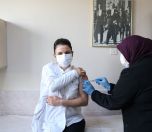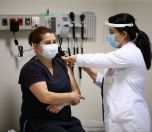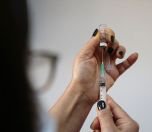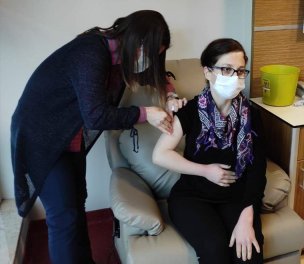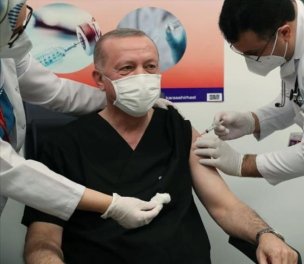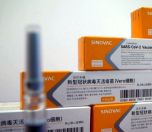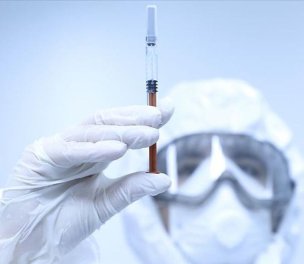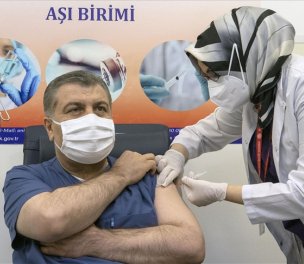* Photo: Anadolu Agency (AA) - Archive
Click to read the article in Turkish
Turkey's Ministry of Health has responded to the frequently asked questions about the ongoing COVID-19 vaccination campaign in the country.
CLICK - Turkey to start vaccinating citizens over the age of 85
The first batch of 3 million doses of the vaccine developed by China's Sinovac arrived in Turkey on December 30, 2020.
Health Minister Fahrettin Koca said yesterday that COVID-19 vaccinations for people over the age of 85 would start today (January 21).
In the first stage of the vaccination program, over one million citizens, including over 980,000 health care professionals, the elderly and personnel at nursing homes, have been vaccinated so far.
Against this backdrop, the Ministry has answered the 37 most frequently asked questions about the vaccination program in Turkish on the Health Ministry's COVID-19 vaccination information platform.
As compiled by the state-run Anadolu Agency (AA) for international readers, some of these questions and their answers are as follows:
'Protection period not yet known'
- I have already had COVID-19, should I still get vaccinated?
Protection against the virus continues for a while in those who have had COVID-19. Therefore, people who had contracted the infection are not among the groups to be vaccinated.
- For how long will I be protected against COVID-19 after I get the vaccine jab?
The protection period of COVID-19 vaccines is not yet known, and additional research is needed for this.
- How many doses of the vaccine will be administered?
People aged 18 and over will be administered a total of two doses, four weeks apart.
'Keep following the rules'
- Will I continue to follow the rules for wearing masks and social distancing after I get the vaccine?
Even after being vaccinated, you could still infect others. For this reason, the rules for wearing masks, social distancing, and hygiene must be followed.
- Is it mandatory to get the vaccine jab?
Vaccination is not compulsory in Turkey. For this reason, public awareness regarding vaccines is being carried out by the Health Ministry.
- Why are prioritization strategies applied in COVID-19 vaccination?
The vaccination stages were determined considering the risk of exposure to infectious disease, severely catching the disease, and transmission.
- Why are healthcare professionals vaccinated at the first stage?
Health care professionals have the highest risk of exposure to COVID-19.
'No serious side effects encountered'
- Do vaccines other than COVID-19 help protect from the virus?
There is no evidence that vaccines other than the COVID-19 vaccine protect against the pandemic.
- I just got the flu or pneumonia vaccine. Can I get a COVID-19 vaccine?
At least two weeks after getting the flu or pneumonia vaccine, you can be administered the COVID-19 vaccine.
- Does having had COVID-19 provide longer protection than being vaccinated?
The level of immunity varies according to the disease and the person. Since the COVID-19 agent SARS-CoV-2 is a new virus, it is not known for how long natural immunity is gained.
- Are there any side effects of the COVID-19 vaccine?
No serious side effects have been encountered in clinical studies conducted for COVID-19 vaccines and in current vaccine applications to date. The side effects after vaccination are often mild, such as fatigue, headache, fever, chills, muscle/joint pain, vomiting, diarrhea, along with pain, redness, and swelling in the area of the jab.
'Not administered to positive cases'
- For whom is the COVID-19 vaccine not recommended?
People under the age of 18 will not be administered the vaccine. The vaccine will not be administered to people who have tested positive for COVID-19 by PCR test and to people who have been in contact with a COVID-19 case within 10 days before vaccination.
- What are the situations in which the vaccine should not be administered?
If there is a history of allergy/anaphylaxis against any substance contained in the vaccine, vaccination is not recommended.
- Why are people aged 65 and over prioritized for vaccination?
People aged 65 and over have a higher risk of contracting COVID-19, hospitalization, or even death. (EKN/SD)




.jpg)
